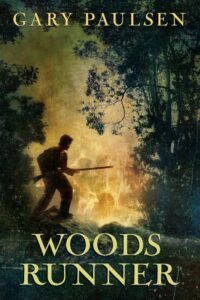 More than 170 years after the opening shots of the American Revolution were fired, the term “collateral damage” first became part of the vocabulary of war. But it happened, in numbers too astronomical to count, during that war and in every war before or since.
More than 170 years after the opening shots of the American Revolution were fired, the term “collateral damage” first became part of the vocabulary of war. But it happened, in numbers too astronomical to count, during that war and in every war before or since.
The tragedy of collateral damage—defined as incidental death, injury or harm to nonmilitary persons or property—hit home for me recently when I read the teen novel “Woods Runner” by Gary Paulsen, published by Random House in 2010. Fans of Middle Grade or Young Adult fiction are no doubt acquainted with Paulsen. During his long life (1939-2021), he wrote more than 200 novels and many magazine articles, plays and short stories, most aimed at teens but enjoyed by adults, too. I’ve read lots of Paulsen’s books and liked them all, but my favorite—and arguably his most popular novel–is “Hatchet.”
It wasn’t until my granddaughter Clara recommended “Woods Runner” just a few months ago that I decided to give it a go. First, I listened to the audiobook, borrowed for free on the Libby library app. I was so taken with it that I bought a paperback copy, which I re-read before writing this column.
Thirteen-year-old Samuel is the novel’s protagonist. He lives with his parents on the untamed edge of the Pennsylvania wilderness. Samuel knows how to hunt and how to survive in the woods. Rumors that American patriots back east have begun a bloody war against the English mean little to him or his family (“just some trouble in Boston”) until British soldiers and their Iroquois allies attack the settlement where Samuel lives.
Samuel is eight miles away, hunting, when the massacre occurs. When he smells smoke, he high-tails it for home, where he discovers that all the cabins have been burned to the ground and several of his neighbors—including children—shot or bludgeoned or hacked to death. Others, including his parents, are missing. After quickly burying the dead, Samuel sets off to find them.
I won’t ruin the story by telling much more, except to say that Samuel shoots and kills two men in self-defense. He comes close to death himself more than once. He witnesses, in horrifying detail, a scene of barbaric destruction wrought by Hessian mercenaries. He saves a little girl’s life. And he follows his parents’ captors all the way to British headquarters in New York City.
As to whether he rescues them, I’m not going to tell. But I will say that this story kept me on the edge of my seat even the second time through.
There are no battles scenes in this novel. No Lexington and Concord or Bunker Hill or Trenton or Saratoga or Cowpens or Yorktown. No famous war heroes appear in these pages. Not George Washington or Paul Revere or Sam Adams or Alexander Hamilton or Patrick Henry or any of the others whose names we speak this time of year. “Woods Runner” is simply the story of a brave young man thrust into the thick of the American Revolution through no fault of his own.
We learn about starvation and dehydration and gangrene and dysentery and infected wounds and amputations and hand-to-hand combat and inhumanely crowded prisons and war orphans and a whole lot of other horrible stuff in its pages. We learn that out of the 200,000 men who fought on the American side in the Revolutionary War, a staggering 110,000 died. Some of those deaths occurred in battle. But many more were due to injury or illness that’s part of every war. As for collateral damage, those numbers are impossible to come by.
As we moved past the parades and cookouts and fireworks and stirring patriotic speeches that characterize Fourth-of-July celebrations, may we never lose sight of the heroism and sacrifice our war for independence exacted. And may we strive to protect the democracy so many fought and died to secure.
No more kings. No more kings.
(July 6, 2024)